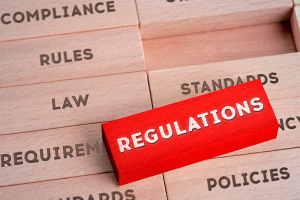CMS guidance on emergency drill exemption
CMS guidance on emergency drill exemption
The Centers for Medicare & Medicaid Services (CMS) issued guidance related to emergency preparedness testing exercise requirements in the context of the COVID-19 public health emergency. The guidance helps to clarify published rules Medicare and Medicaid Programs; Regulatory Provisions To Promote Program Efficiency, Transparency, and Burden Reduction; Fire Safety Requirements for Certain Dialysis Facilities; Hospital and Critical Access Hospital Changes To Promote Innovation, Flexibility, and Improvement in Patient Care Final Rule (84 FR 51732). The provider’s emergency preparedness testing scheduling and when the provider implemented their incident command center will impact what types of testing exercises will still be required. Additional details can be found in CMS S&C Letter QSO-2-41-ALL.
CDC updates airborne transmission guidance
The Centers for Disease Control and Prevention (CDC) updated its guidance on how COVID-19 spreads to acknowledge published reports showing “limited, uncommon” circumstances where people with COVID-19 infected others who were more than 6 feet away. “In these instances, transmission occurred in poorly ventilated and enclosed spaces that often involved activities that caused heavier breathing, like singing or exercise,” the agency says. “Such environments and activities may contribute to the buildup of virus-carrying particles. CDC’s recommendations remain the same based on existing science.”
CMS issues categorical waiver on medical tubing
The Centers for Medicare & Medicaid Services issued a Categorical Waiver for Corrugated Medical Tubing (CMT). This categorical waiver addresses the use of CMT in new and existing health care facilities based on provisions provided in the 2018 edition of NFPA 99, Health Care Facilities Code. The 2012 NFPA 99 requires medical gas and vacuum system tubing to be rigid copper tubing and does not allow for the use of CMT. “In certain applications, the inability to use CMT may be considered an unreasonable hardship as the installation of CMT may be more efficient and economical,” the waiver states. This categorical waiver allows the use of CMT in compliance with provisions of the 2018 edition of NFPA 99.
CMS issues guidance on nursing home visitations
The Centers for Medicare & Medicaid Services (CMS) issued new guidance for visitation in nursing homes during the COVID-19 public health emergency. The guidance provides reasonable ways a nursing home can safely facilitate in-person visitation to address the psychosocial needs of residents. It also explains that CMS has approved the use of Civil Money Penalty funds to purchase items that can create physical barriers or designated spaces that will help to limit the transmission of the virus during in-person visits, such as tents for outdoor visitation and/or clear dividers. The guidance also emphasizes core principles of COVID-19 infection prevention, such as hand hygiene, cleaning and disinfecting high-frequency touched surfaces, effective resident cohorting and instruction signage throughout the facility to reinforce best practices.




